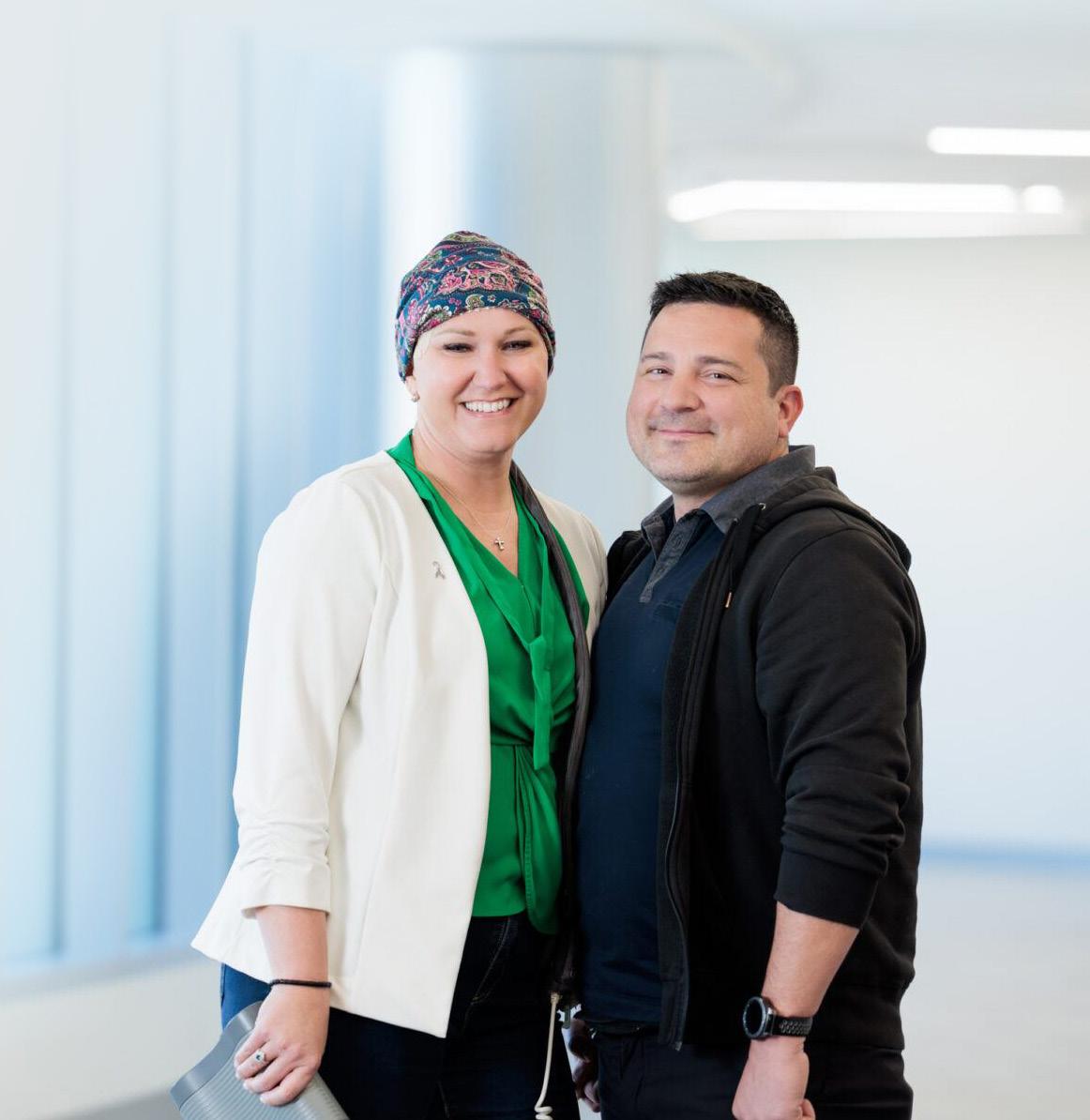
4 minute read
Patient Highlight: Arizona Mom says Glioblastoma Saved Her Life
Arizona mom of two children
Jenn Ortiz was diagnosed with brain cancer in August 2020. She learned her glioblastoma was the most aggressive and deadly form of brain cancer and that she may have only 12-15 months to live.
Advertisement

Barrow Institute’s Ivy Tumor Center Provides Hope
Glioblastoma brain tumors often recur and Jenn’s did. For those with recurrent glioblastoma, treatment options are very limited, and there is no standard therapy. Not one to take “no” for an answer, Jenn looked for alternatives and found a Phase 0 clinical trial at the Barrow Neurological Institute’s Ivy Brain Tumor Center.
The clinical trial was testing a new drug, AZD1390, which can make tumor cells more vulnerable to radiation therapy. Jenn took the drug for three days before surgery to remove the tumor. Her neurosurgeon, Nader Sanai, MD, removed the brain tumor and the Ivy Center’s team of scientists quickly tested it to see if the drug had reached the tumor and had its intended effect. It did. Jenn continued taking the drug during treatment.
“Unfortunately, for those with high-grade gliomas, the battle is never over,” says Dr. Sanai, director of the Ivy Brain Tumor Center and director of Neurosurgical Oncology at Barrow Neurological Institute. “We’re singularly focused on finding a cure for these aggressive tumors, and Phase 0 clinical trials, like the one Jenn participated in, give us a direct avenue for rapid drug discovery.”
Jenn’s latest tests and MRI show no signs of brain tumor regrowth. Jenn credits her care team and the clinical trial for saving her life. “I’ll do any trial or anything I can do to save my life and anyone else’s,” she says.
Partner Institutes
Benaroya Research Institute
Seattle, WA
Over the past year, the Benaroya Research Institute Clinical Research Program and Virginia Mason Medical Center maintained a robust clinical research portfolio with more than 480 research studies conducted, involving more than 175 investigators, collaborating with more than 160 organizations globally, and executing 122 clinical research contracts and amendments. The impact of the research is seen both immediately and locally, as well as reaching well beyond our walls.
Highlights By the Numbers
Research Volume Forecast: $83 million
Publications and Presentations (CY22): 187
Funding: 71% Federal Grants
107 Active Grants
• Federal Prime – 29
• Federal Subawards – 57
• Foundation – 21
Active Collaborative Research Agreements: 18
Clinical Trial Agreements and Amendments: 122
Principal Investigators: 25
Workforce Members: 325+
2023 Virginia Mason Medical Center Clinical Research Program Highlights
Brought cutting edge technology and devices to Virginia Mason Medical Center (VMMC) through participation in clinical trials, including participating in a trial evaluating the EVOQUE valve, a device designed to replace the tricuspid valve without open heart surgery, which sets up VMMC to be among the first institutions to gain access to the device upon FDA clearance.
VMMC continued their partnership with GT Medical on GammaTile, a device that is placed at the precise site of brain tumor removal to allow for more focused radiation treatment. A couple years ago, VMMC was among the first in the nation to be able to provide this procedure.
VMMC teams also contributed to development of a variety of therapeutic agents, including a new FGFR Inhibitor,
Futibatinib, that is now approved by the FDA for the treatment of previously treated, unresectable, locally advanced or metastatic intrahepatic cholangiocarinoma, as well as a shingosine-1phosphate inhibitor, Estrasimod, that is currently under review by the U.S. FDA and European EMA for treatment of moderately-to-severely acute ulcerative colitis.
The work of VMMC researchers informed standard of care, including publishing data from NIH/NCI AIDS Malignancy Consortium ANCHOR Study indicated that treating precursor lesions with hyfrecation electrocautery significantly reduces risk of progression to anal cancer and is informing changes in standard of care.
VMMC teams also coauthored more than 40 peer-reviewed clinical research articles.
Vmfh Center For Cardiovascular Health Research Highlights
The Cardiovascular Health team is participating in three pivotal structural heart clinical trials:
Repair MR: This is a randomized controlled trial comparing the MitraClip device with surgical repair in patients with severe primary mitral regurgitation.
TRISCEND II: This is a randomized trial designed to compare the EVOQUE Transcatheter Tricuspid Valve replacement System and Optimal Medical Therapy vs. Optimal Medical Therapy in treating patients with Severe Tricuspid Regurgitation.
CLASP II TR: This trial will evaluate the superiority of the PASCAL Transcatheter Valve Repair System and Optimal Medical Therapy vs. Optimal Medical Therapy in treating patients with Severe Tricuspid Regurgitation.
(Continued on next page.)
(Continued from previous page.)
Vmfh Center For Digestive Health Research Highlights
In FY 2023, the Digestive Health team had nearly 120 active research projects, including 30 clinical research trials, published over 40 manuscripts with many more awaiting publication and authored five book chapters.
DREAM (Diabetes Related to Acute Pancreatitis and Its Mechanisms): An observational research trial sponsored by the National Institute of Diabetes and Digestive and Kidney Diseases looking at the relationship between acute pancreatitis and the development of diabetes.
Vmfh Center For Neurosciences And Spine Research Highlights
Philip Louie, MD, the Center for Neuroscience and Spine’s Director of Research and Academics, and the CNS research team have focused on expanding collaboration with the University of Washington’s School of Medicine, culminating in students publishing five manuscripts and nine podium presentations and 12 poster presentations across the U.S. and Europe.
TDABC (Time-Driven Activity-Based Costing): These studies aim to evaluate the combination of TDABC and lean methodologies to detect meaningful variability in time-based care. These studies utilized TDABC to evaluate hip replacement surgeries, lumbar fusion surgeries, and to assess the cost- effectiveness of our multidisciplinary spinal deformity conferences.
GRIT: Grit is defined as trait-level perseverance and passion for longterm goals within challenging domains over and beyond measures of talent. This study demonstrated an association between grit and outcomes following elective spine surgery.
Socioeconomic Disparities: This study evaluates the impact of various socioeconomic factors (income, insurance, race, education, and others) on the wait time (from initial referral date to spine surgeon consultation) for patients presenting seeking a spine surgeon for low back problems.
Vmfh Section Of Urology
The Virginia Mason Franciscan Health Section of Urology prioritized patient-centered research approaches, promoted diversity in participation, and fostered meaningful collaborations through multiple studies.

Engaging and Amplifying Women’s Voices in Stress Urinary Incontinence Research Prioritization Project: Funded by the Patient Centered Outcomes Research Institute, in partnership with team members from the University of Washington, National Association for Continence, and Kaiser Permanente this study explores the concerns of women with Stress Urinary Incontinence and what is important to them when making health care decisions.
Creating an Extraordinary Experience for Women Undergoing Cystoscopy : A Patient-Centered Approach to Process Improvement: The Virginia Mason Production System was utilized to improve the patient experience for women undergoing cystoscopy, a scope procedure examining the bladder.
“Vagina” Is Not a Bad Word: Historical and Contemporary Censorship of the Word “Vagina”: A peer-reviewed journal article that shed light on policies surrounding censorship of the word “vagina” on multiple online and media platforms, and discussed its impact on women’s pelvic health. This work won the 2022 American Urological Association Retrospectroscope award.






